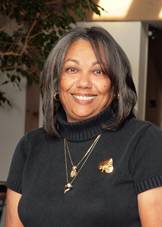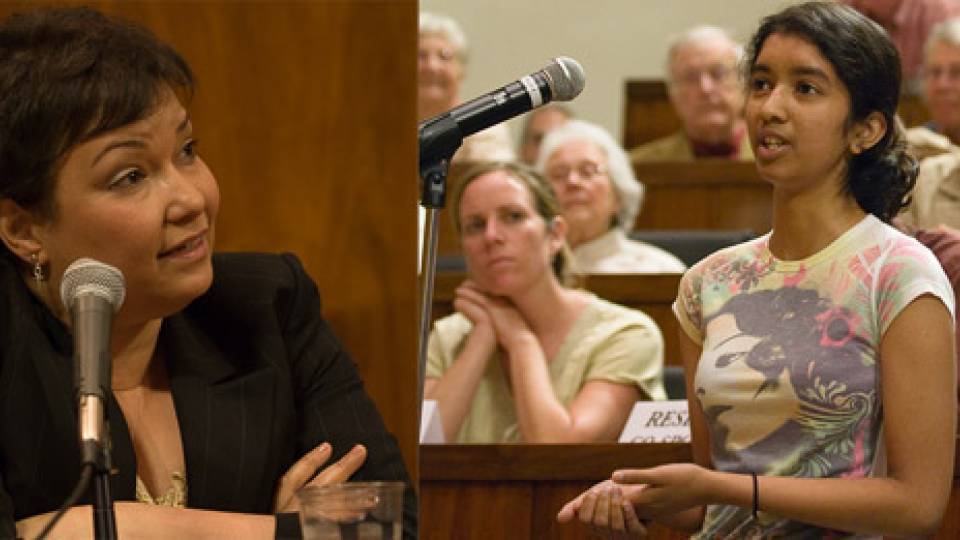Robinson-Moore selected to lead during transition
The Princeton-Blairstown Center is in the process of a major transition with a goal of providing the nonprofit organization with sustained and better structured opportunities to empower urban youth.
Wardell Robinson-Moore, who has been connected with the center since her appointment to its board of trustees in 1995, has been selected to guide the transition as interim executive director.
The center is affiliated with the University and operates adventure-based and experiential education programs for urban youth and their families. Until now, most of these programs have been delivered during the summer at the facility near Blairstown in northwestern New Jersey. The center also has an administrative staff housed in offices in Princeton.
In 2005, the center launched a full-scale examination of the challenges faced by urban youth, including poverty, gangs and violence, and reviewed the programs offered by Blairstown, identifying areas of programming that could be revamped in order to be more responsive. In March 2006, the center's program committee, made up of board members, staff members and community members, worked in consultation with young people and agencies that Blairstown served to develop goals and a general description of what the new program should be. The concept then was approved by the Blairstown board.
"Our programming will provide young people with a continuum of experiences over time that will help them to build the strengths that they have, unfetter the talents and the intelligence that are theirs in such a way that they will stand firm and determined in the face of the most daunting of challenges," said John Webb, current co-president of the Blairstown board, who chaired the program committee.
"The goals that we have articulated cannot be accomplished in the one-, two- or three-week stays at camp that have been the centerpiece of previous programming at Blairstown," added Webb, who also is director of the University's Program in Teacher Preparation. "In fact, they cannot be accomplished by the Princeton-Blairstown Center alone. These goals speak of enduring strengths and enduring understandings, the development of which require a dedicated, comprehensive and long-term approach that necessitates a complete restructuring of our programming and the creation of concrete partnerships between the center and other organizations."
During this academic year, the center is establishing "deep partnerships" with six schools and agencies in Camden, Philadelphia, Newark, Trenton and Princeton. The plan is to identify cohorts of young people in each location who will work with center staff over an extended period of time, from three to six years. The programming will target urban youth ages 11 to 17 who are not realizing their individual potential socially, academically and personally.
"We know that there are many different kinds of opportunities available to young people through countless agencies," Webb said. "We are also aware that many of those programs are more short-term, one-time efforts that, while wonderful and effective, do not carry the potential for the kind of strength and confidence-building that the Princeton-Blairstown Center programming, delivered in collaboration with it partner agencies, will provide. Time is one of the most significant variables in learning, and the Princeton-Blairstown Center intends to make time a significant part of its programming."
Blairstown staff will develop curricula rooted in experiential and social-emotional learning and provide a sequence of learning experiences designed for concentrated multi-year contact with specific groups of young people. The curricula will marry the academic year program with the summer experience at Blairstown, and also will integrate the instructional programs of the partners.
"During the 2007-08 year," Webb said, "we're going to engage in research and development to try out curricula and program delivery models both on the site of our deep partners and the Blairstown facility, evaluate the effectiveness of those curricula and delivery systems and out of that to structure to be implemented in 2008-09 a fully developed program."
Uniquely positioned to lead
Leading the transition will be Robinson-Moore, who first came to Princeton in 1977 as a staff member in the Office of the Dean of Student Affairs. She then joined the Woodrow Wilson School of Public and International Affairs, where she worked for 19 years, first as director of graduate admissions and then as assistant dean for graduate studies. She began and ran a successful summer program for students of color who were interested in pursuing careers in public and international affairs.
Since leaving the University in 1997, she has worked part time at Rutgers University and at the Institute for International Public Policy, a division of the United Negro College Fund Special Programs Corporation. A graduate of Brown University, she earned her M.Ed. from Boston College.
"We are in a crucial transition period that involves every single person who is connected to Blairstown," Webb said. "The paradigm shift is going to impact the board of directors, the executive committee, staff and previous partnerships. A lot of structures have to be reconceptualized. Having someone like Wardell, who has been associated with Blairstown for many years, who has served on its board, who has been its secretary, who knows the workings of Blairstown intimately, and who was there during the conceptualization of this entire program plan and knows it well, is critical. In addition, she has previously been involved with the University and therefore has familiarity with the sponsoring institution and an awareness of the communities we serve and from which we derive support.
"Wardell is acquainted with the whole staff -- she knows what their needs are, what their sensitivities are, what their strengths are, so that she can efficiently and effectively bring all of those elements to bear on the process," he said. "Wardell is uniquely positioned to help guide the organization through this transition period."
Robinson-Moore said that she looks forward to assisting the staff in implementing the enhanced programming. "The opportunity to help fulfill the mission of the center by working with the excellent combined staff up at Blairstown and at Princeton is what drew me to this interim directorship," she said. "I see Princeton-Blairstown Center as poised to embark upon a sustained period of valuable service delivery to our targeted population of underserved youth in the greater New Jersey area. I want to be a part of this effort."
The timing is right
Blairstown and its predecessor programs have been serving young people for nearly 100 years. Founded by undergraduates and alumni in 1908 near Bay Head at the New Jersey shore as the Princeton Summer Camp, the program moved to Blairstown in 1930.
In addition to revamping its programming, the center plans to further professionalize its staff by recruiting well-trained individuals "who are knowledgeable about the lives and realities of our population of young people, who can plan and implement these curricula throughout the school year and then oversee the delivery of programming at Blairstown with the help of summer staff who will be selected from the undergraduate student population at Princeton University," according to Webb.
The staff also is developing mechanisms to conduct long-term, comprehensive and systematic evaluations of the programming to measure its effectiveness and to calibrate the curricula and program delivery system accordingly. "We are already piloting evaluation instruments and procedures for use once full programming has been implemented," Webb said. The number of Blairstown's partners in the programming could be expanded in the future.
He added, "It's an enormous undertaking, but we believe that the timing is right. We have for starters a beautiful facility in Blairstown that has great potential for making a difference in the lives of young people. And there is a very deep commitment on the part of the members of the board and representatives from the University in working with our partners and expanding programs during the academic year so we can really accomplish what the program committee proposed."




